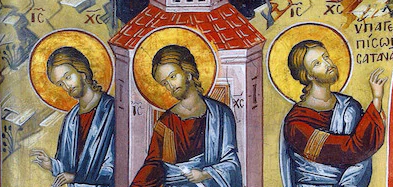Temptations to Sin and Death
First Sunday of Lent Scripture Readings

The readings we’ve been given for today’s liturgy aren’t that easy to understand, separately or taken together. The first reading, from the second creation story in the Book of Genesis, is particularly famous for the wild interpretations applied to it. I spent a great deal of time in my Lenten lectures last year giving the historical, theological, and psychological background to it.[1] The mistake many people make when reading this story is to interpret the actions of the man and woman as a sin passed through generations down to today. Rather, the story of Adam and Eve is an illustration of humanity’s tendency toward disastrous self-reliance. It’s an excellent example of such attitudes as, “I know better,” and “I can’t imagine this applies to me,” and “I’m being taken advantage of,” and “This isn’t fair.”
What are the consequences of these attitudes? In the story, the punishment is painful futility in relationships and work…and death. We mustn’t think that the text implies that the sin of Adam brought death into the world. No part of this physical world was ever meant to be eternal. Death, in this context, means that human self-reliance is deadly to relationships. It’s deadly to our relationship with God, to our relationship with others, and to our relationship with our own future selves. The sin of Adam—arrogant self-reliance—brings spiritual death. If the Garden of Eden is symbolic of spiritual life, then God had no need to expel us from it. The delusion of self-reliance caused us to leave it behind of our own free will. Left to our own devices, we have no way back.
That’s why it’s important that, when we read the passage from Saint Paul’s letter to the Romans that is our second reading today, we need to set aside our assumptions that he’s talking about committing sins and physical death. He’s actually writing about Sin with a capital “S”—the attitude of sinful self-reliance—and Death with a capital “D”—the deadly consequences of human arrogance. The sin Paul is talking about—the Sin of Adam—does not deny God, it simply makes God irrelevant. If I believe that everything depends on me, why would I need God? And, because the punishment is intrinsic to the transgression itself, there’s no need for God to punish. Sin itself brings its own condemnation.
The consequences of the sin of self-reliance seem inescapable. Yet, Saint Paul explains that there is a way out of the conundrum of self-reliance and the futility and isolation that result from it. Our escape route leads through the death and resurrection of Christ. Jesus’s obedience unto death—death on a cross—embodied his abandonment of all arrogant self-reliance and his self-abandonment into the care of his loving Father. That self-abandonment to God flies in the face of all our instincts and fears, so much so that it’s impossible without God’s help—what we call “grace.” And God’s grace remains unavailable to us so long as we imagine that we’re in control, and until we’ve had a change of mind and heart—a metanoia—that begins with the admission that our lives are unmanageable on our own.
What does this change of mind and heart look like? Consider today’s gospel reading. The temptations of Christ as described by Matthew are not, strictly speaking, historical events. They are paradigmatic illustrations of the temptations that hounded Jesus throughout his life and ministry…even to the end. They’ve continued to plague his followers in the Church ever since. They’re the three temptations that lead inexorably back into the self-sufficiency trap. They’re the temptations to become our own saviors. Look at them. They’re wealth, power, and prestige. They’re the desires that nag at us ceaselessly. They say, “If I only had that, I’d be all set and happy.” Can you hear, “If you are the Son of God, command that these stones become loaves of bread?” Or, they may be saying, “If they’d only give me the respect I deserve, I’d be fine. After all, don’t they know who I am?” Aren’t there echoes of, “If you are the Son of God, throw yourself down…come down from that cross, and we will believe in you?” Or, perhaps they whisper, “If they’d only listen to me and do as I say, we wouldn’t have these problems.” And the devil “showed him all the kingdoms of the world…’All these I shall give to you…’”
The temptations to wealth, power, and prestige are with us always, falsely promising us salvation from our problems by our own self will run riot. What they bring us instead is death—spiritual death—the destruction of our interconnectedness with God and our world. But this is our accepted time. This is the moment when we’re invited to acknowledge our powerlessness and the insanity of our illusions of control. Lent is our time to remember to change our minds and hearts and follow Jesus’s lead.
“Have among yourselves the same attitude that is also yours in Christ Jesus, Who, though he was in the form of God, did not regard equality with God something to be grasped. Rather, he emptied himself, taking the form of a slave, coming in human likeness; and found human in appearance, he humbled himself, becoming obedient to death, even death on a cross” [Philippians 2:5-8].
[1] It might be worthwhile for you to look over that talk. You’ll find it under the “Lectures” menu heading on the GBChapel.com website. It’s Session 6 of the Lent 2022 series.
Get articles from H. Les Brown delivered to your email inbox.
